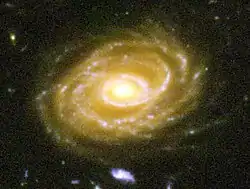| UDF 423 | |
|---|---|
 Spiral galaxy UDF 423 in the Hubble Ultra Deep Field | |
| Observation data (J2000 epoch) | |
| Constellation | Fornax |
| Right ascension | 03h 32m 39.16s[1] |
| Declination | −27° 48′ 44.7″[1] |
| Redshift | 1 (or 0.46)[2] |
| Distance | 7.7 billion light-years (or 4.7 billion light-years) (light travel distance)[3] ~10 billion light-years (or 5.7 billion light-years) (present comoving distance)[3] |
| Apparent magnitude (V) | 20[1] |
| Characteristics | |
| Apparent size (V) | 0.11' x 5.04"[1] or 0.0027' x 0.0027' |

UDF 423 is the spiral galaxy in the lower right quadrant of the Hubble Ultra Deep Field.
UDF 423 is the Hubble Ultra Deep Field (UDF) identifier for a distant spiral galaxy. With an apparent magnitude of 20,[1] UDF 423 is one of the brightest galaxies in the HUDF and also has one of the largest apparent sizes in the HUDF.[1]
Distance measurements
The "distance" of a far away galaxy depends on how it is measured. With a redshift of 1,[2] light from this galaxy is estimated to have taken around 7.7 billion years to reach Earth.[3] However, since this galaxy is receding from Earth, the present comoving distance is estimated to be around 10 billion light-years away.[3] In context, Hubble is observing this galaxy as it appeared when the Universe was around 5.9 billion years old.[3]
See also
References
This article is issued from Wikipedia. The text is licensed under Creative Commons - Attribution - Sharealike. Additional terms may apply for the media files.